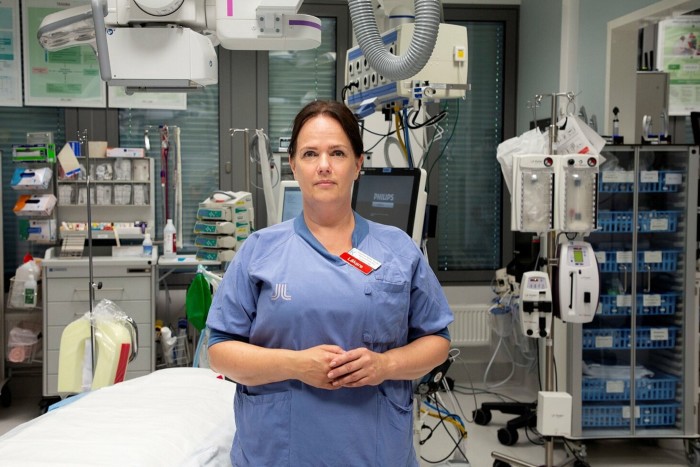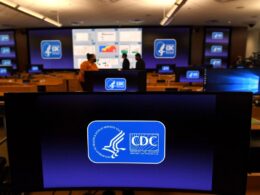Financial Times
September 9, 2022
Site editor:
Joaquim Cardoso MSc.
Health Transformation Journal
September 9, 2022
Lotta Nilert was one of the millions of people globally who were receiving cancer treatment when the coronavirus pandemic erupted. But her care at Stockholm’s Karolinska University Hospital did not miss a beat.
“Between the surgeon, the oncologists and the ward they’re very well co-ordinated.
They know their patients well so they know how to prioritise,” said the Swedish retiree, 70, adding she was now “feeling fine” and hopeful of making a full recovery.
Nilert was among the lucky ones.
Cancer care around the world has been severely disrupted as the coronavirus crisis consumed resources and deterred many from seeking treatment.
Even in wealthy European countries, cancer screening and treatment have been delayed and waiting lists have swelled.
Cancer care around the world has been severely disrupted as the coronavirus crisis consumed resources and deterred many from seeking treatment.
Even in wealthy European countries, cancer screening and treatment have been delayed and waiting lists have swelled.
The European Cancer Organisation, which represents professionals and patients, has calculated that about 100mn cancer screening tests were missed across Europe and 1mn cancers went undiagnosed during the first year of the pandemic.
.. about 100mn cancer screening tests were missed across Europe and 1mn cancers went undiagnosed during the first year of the pandemic.
Mark Lawler, co-chair of the ECO’s special network studying the impact of Covid-19 on cancer, said that in the UK alone, the impact could be felt for a decade.
“We probably need to be working at 130 per cent capacity for a number of years just to catch up,” said Lawler, a Queen’s University Belfast professor.
“We’re in a race against time to detect those 1mn undiagnosed cancers,” he added.
in the UK alone, the impact could be felt for a decade.
We probably need to be working at 130 per cent capacity for a number of years just to catch up
“We’re in a race against time to detect those 1mn undiagnosed cancers

Isabel Rubio, head of breast surgical oncology at Clinica Universidad de Navarra in Madrid, said Spain had increased the resources devoted to breast screening to ensure women who missed out in 2020 could have their scans.
But resources for treatment had not risen to the same degree, leaving some unclear when their surgeries would take place. This was “more of a stress to the patient, besides the stress of having breast cancer”, she said.
Spain had increased the resources devoted to breast screening to ensure women who missed out in 2020 could have their scans.
But resources for treatment had not risen to the same degree, leaving some unclear when their surgeries would take place.
In France, a study reported in The European Journal of Cancer simulated scenarios based on data from a large French comprehensive cancer centre’s discharge database.
It found 6–8 per cent of 13,000 patients who required hospital care experienced delays of more than two months.
“Pandemic-related diagnostic and treatment delays in patients with cancer are expected to impact patient survival,” the researchers concluded.
In France … 6–8 per cent of 13,000 patients who required hospital care experienced delays of more than two months.
Pre-pandemic resilience of countries’ health systems has been an important indicator of how well they fared during the Covid crisis, according to Lawler.
“There’s a big challenge in certain central and eastern European countries and unfortunately that reflects a lack of investment and focus in the first place on cancer services,” he explained.
“There’s a big challenge in certain central and eastern European countries and unfortunately that reflects a lack of investment and focus in the first place on cancer services
One pervasive problem across Europe is staff shortages, with ranks depleted by sickness, stress and other factors.
Lawler said four out of 10 people working in cancer care described themselves as burnt out, while three in 10 showed signs of clinical depression, in a survey conducted by his organisation.
One pervasive problem across Europe is staff shortages, with ranks depleted by sickness, stress and other factors.
40% of people working in cancer care described themselves as burnt out, while 30% signs of clinical depression

The world-renowned Karolinska has also suffered from a staffing squeeze and has been forced to hire additional nurses from private agencies.
But its success offers a salutary example to other health systems, demonstrating that a depleted workforce need not necessarily condemn a system to poor performance.
A collaborative management culture — in which individual fiefdoms are discouraged and senior clinicians take responsibility for providing an agreed number of operations or procedures — and the sophisticated use of data has allowed it not only to maintain its pre-pandemic performance but greatly exceed it, performing 1,500 more surgeries than originally planned.
At Karolinska (Sweden), acollaborative management culture — in which individual fiefdoms are discouraged and senior clinicians take responsibility for providing an agreed number of operations or procedures — and the sophisticated use of data has allowed it not only to maintain its pre-pandemic performance but greatly exceed it, performing 1,500 more surgeries than originally planned.
Caroline Hällsjö Sander, an anaesthetist who manages the hospital’s operating theatres, called up a dense, colour-coded chart on a screen on the wall that allowed staff to track cancer patients’ progress and ensure that the most urgent are prioritised.
Patients delineated in blue have a scheduled time slot in an operating theatre within 30 days.
Grey denoted those still within the time limit but so far without a time slot. “We have to plan for them,” Sander added.
Patients in red have already waited more than 30 days but this is generally due to medical reasons, such as the need to have chemotherapy before surgery. “We check on them every day,” she said.
In an act of democratisation, this data can be accessed by everyone involved in clinical care from doctors to less senior members of the team.
“It’s all a collective decision about how the hospital needs to use its assets . . . it’s based on need,” Sander said.
“It’s all a collective decision about how the hospital needs to use its assets . . . it’s based on need,
Lawler said countries with the equipment and facilities to diagnose cancers at earlier and more treatable stages were more likely to have done well, citing the Netherlands as another top performer.
A Dutch target that no patient should wait more than six weeks for treatment after a diagnosis has been honoured, after the government made it a priority.
A Dutch target that no patient should wait more than six weeks for treatment after a diagnosis has been honoured, after the government made it a priority.
Thijs Merkx, who runs the Netherlands’ Comprehensive Cancer Organisation, said:
“ Due to Covid, we’ve created waiting lists for elective care, for plastic surgery, eye surgery, orthopaedics, dermatology but oncology is a life threatening disease and for that kind of care we don’t have waiting lists, even during the pandemic.”
“ Due to Covid, we’ve created waiting lists for elective care, for plastic surgery, eye surgery, orthopaedics, dermatology but oncology is a life threatening disease and for that kind of care we don’t have waiting lists, even during the pandemic.”
At the Karolinska, simple steps have also made a difference.
Aware that patients sometimes decided at the last minute not to go through with surgery, the hospital operates a waiting list — “like an airline”, Sander said — of people willing to be called in at short notice.
Aware that patients sometimes decided at the last minute not to go through with surgery, the hospital operates a waiting list — “like an airline”,… of people willing to be called in at short notice.
Until the system was introduced, it was not uncommon for a four-hour surgery session to be wasted.
Two years before the pandemic, hospital bosses also extended the operating day, with elective surgery taking place until late at night and sometimes on weekends.
Two years before the pandemic, hospital bosses also extended the operating day, with elective surgery taking place until late at night and sometimes on weekends.
Surgeons also commit to carrying out a set number of operations, with performance against these targets rigorously monitored.
Surgeons also commit to carrying out a set number of operations, with performance against these targets rigorously monitored.
Sander said she believed that the Karolinska’s approach was unique in Europe. “I think we’re in the front line here,” she said. “It can always get better, of course, but quality-wise we have good results.”
Originally published at https://www.ft.com on September 8, 2022.
Names mentioned
Stockholm’s Karolinska University Hospital
The European Cancer Organisation
Mark Lawler, co-chair of the ECO’s special network
Isabel Rubio, head of breast surgical oncology at Clinica Universidad de Navarra in Madrid,
The European Journal of Cancer
Caroline Hällsjö Sander, an anaesthetist who manages the hospital’s operating theatres,
Thijs Merkx, who runs the Netherlands’ Comprehensive Cancer Organisation












